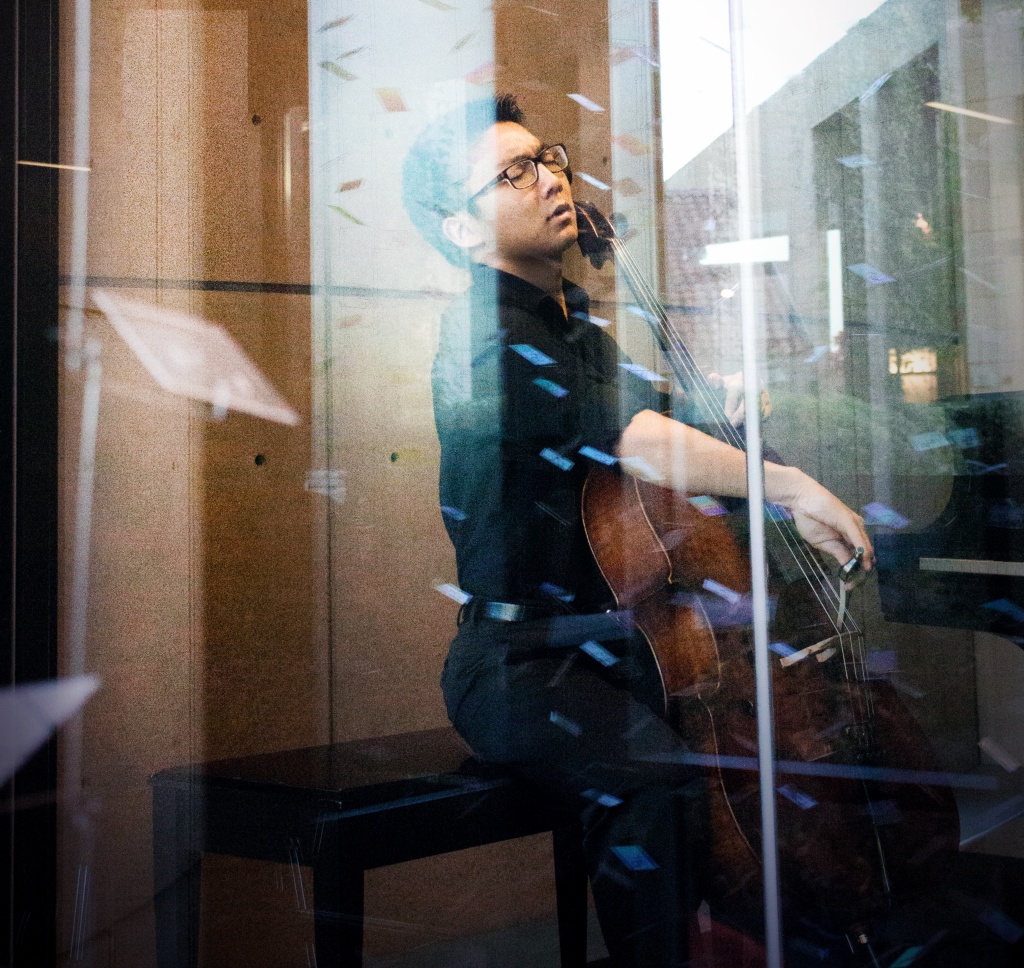
Michael Chung takes care of his calluses.
They’ll soften after a solid bout of practice. Practice too briefly before taking a break, though, and they’ll promptly lose their tactility. The process of re-softening, retrieving an optimum of flexibility and durability, can be painful.
So, naturally, Chung practices cello in blocks of hours, skipping meals, if necessary, to make the most of his time. In the case of Chung, an ITALIC freshman and student of Chris Costanza, six hours per day during his high school summer breaks did the trick.
“I hate practicing so much but I have to,” says Chung. He considers himself a technical player but recognizes the importance of musicality, whether innate or learned. “Musicality can be developed,” he explains. “It can be acquired. You’re born with it, or you have to take a kind of analytical approach.”
For the latter, it’s necessary to approach the music with a mind to problem-solving. Chung enjoys the beauty of logic—puzzles, mathematics, proofs—and notes that there’s often a very specific means for fixing a problem. Music, for all its subjectivity, has an underlying regularity that takes on new life when molded by different artists. For Chung, rhythm is a unifying quality across genres and time.
But it’s not rhythm in the dictionary sense of the word. “It’s this mindset where you can play anything and still have this flow,” he says. “It’s this defined way that the music will flow, and it’s the same whether it’s pop or classical or ethnic music in the middle of nowhere. I’m still finding that pore—different types of music have different rhythms.”
A piece’s rhythm is oftentimes heavily influenced by its time—baroque music is expansive, says Chung, elevated: “you’re playing for God.” Classical music is like saccharine and his least favorite (“Everything’s too happy. I don’t just like to feel happy. I want to feel something.”), and romantic and contemporary pieces are among his favorites. Contemporary music could be understood as an extension of romantic music.
“Romantic music was when composers realized, ‘I can play this for myself,’” says Chung. The result was music that connected more intimately. It also opened a floodgate to more individualistic approaches to playing. Chung acknowledges the duality of approaches manifested in two of his favorite performers, Yo-Yo Ma and Janos Starker. The former, an effusive performer, embodies the romantic era. “He’s a ham,” says Chung, smiling. “Starker, on the other hand, is an extreme minimalist. All his movements are very calculated. Watching him play is a spiritual experience. Completely impassive, more refined.”
Chung considers himself a performer in the school of Yo-Yo, though the onstage ham says little about the offstage persona. “As soon as I step offstage, I start shaking violently,” says Chung. Call it shock, call it the fallout of an intensely musical experience: for Chung, music is communal, a continuous back-and-forth.
He said as much in his once-sentence application to the ITALIC program, where students were asked to complete the phrase “Art should…”
“Art should intrigue, impact, and inspire,” says Chung. “It should affect you in some way. I get super affected. I cry really easily.”
He particularly admires composers who’ve made political statements with their compositions. Shostakovich, at once hated and needed by Stalin; Smetana, whose music provided the soundtrack for Czech nationalism.
Chung strives for this kind of communication, though a few obstacles stand in his way.
“My instrument is way out of my league,” he laughs. “The C string has the deepest, warmest sound. You hear it and it stirs something, deep down. This cello is so mature. There’s so much depth.” Chung also sings (for the Mendicants!) and contrasts voice and instrumental performance. Where musicality and phrasing are similar, voice is a more natural extension of the body.
“If you think about it, the whole idea of playing a cello is really weird,” says Chung. “You have a wooden box with some twisted metal strings strung on it, and you’re scratching it with a stick and horsehair, and there’s tree sap on the horsehair. And then you’re using your fingers to change the lengths of the strings.”
But the whole is much greater than the sum of its parts, and Chung understands this—music doesn’t exist in a vacuum. Rather, it is informed by its audiences, its capacity for communication, and the callused hands of its practitioners.
***
Photo credit: Sharyn Lee
